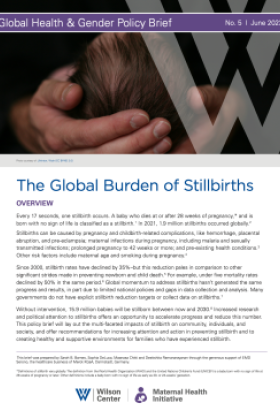Global Health & Gender Policy Brief: The Global Burden of Stillbirths


In 2021, 1.9 million stillbirths occurred globally. A baby who dies at or after 28 weeks of pregnancy,* and is born with no sign of life is classified as a stillbirth. Stillbirths can be caused by pregnancy and childbirth-related complications, like hemorrhage, placental abruption, and pre-eclampsia; maternal infections during pregnancy, including malaria and sexually transmitted infections; prolonged pregnancy to 42 weeks or more; and pre-existing health conditions. Other risk factors include maternal age and smoking during pregnancy.
While the rates of stillbirth have reduced since 35 percent since 2000, it pales in comparison to other significant strides made in preventing newborn and child death For example, under five mortality rates declined by 50% in the same period. Without intervention, 15.9 million babies will be stillborn between now and 2030. Increased research and political attention to stillbirths offers an opportunity to accelerate progress and reduce this number.
In a new policy brief, The Global Burden of Stillbirths, the Wilson Center’s Maternal Health Initiative lays out the multi-faceted impacts of stillbirth on community, individuals, and society, and offers recommendations for increasing attention and action in preventing stillbirths and creating healthy and supportive environments for families who have experienced stillbirth.
Authors



Maternal Health Initiative
Housed within the Wilson Center's Environmental Change and Security Program, the Maternal Health Initiative (MHI) leads the Wilson Center’s work on maternal health, global health equity, and gender equality. Read more

Explore More
Browse Insights & Analysis
Innovación y desafíos en la lucha contra el cáncer con el Dr. Rafael Sánchez en Tres Respuestas

Niger's River Blindness Lesson

